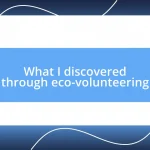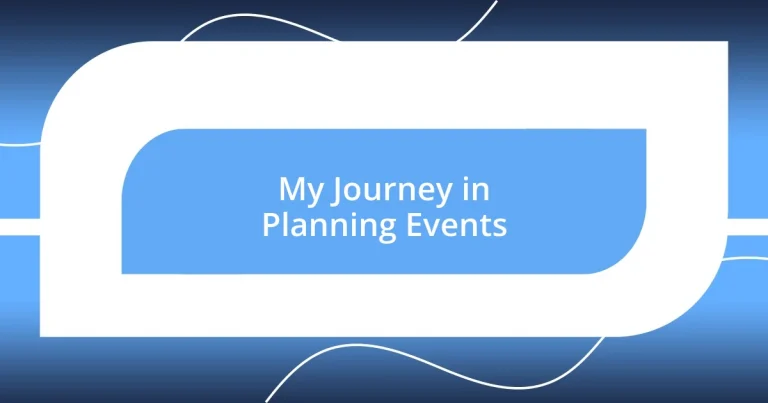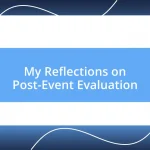Key takeaways:
- Initial interest in event planning stemmed from organizing personal celebrations and volunteering, highlighting the joy of creating connections.
- Key skills for successful event planners include adaptability, attention to detail, and effective communication, essential for handling dynamic situations.
- Evaluating event success involves analyzing both quantitative data and personal feedback to understand the event’s true impact on attendees.
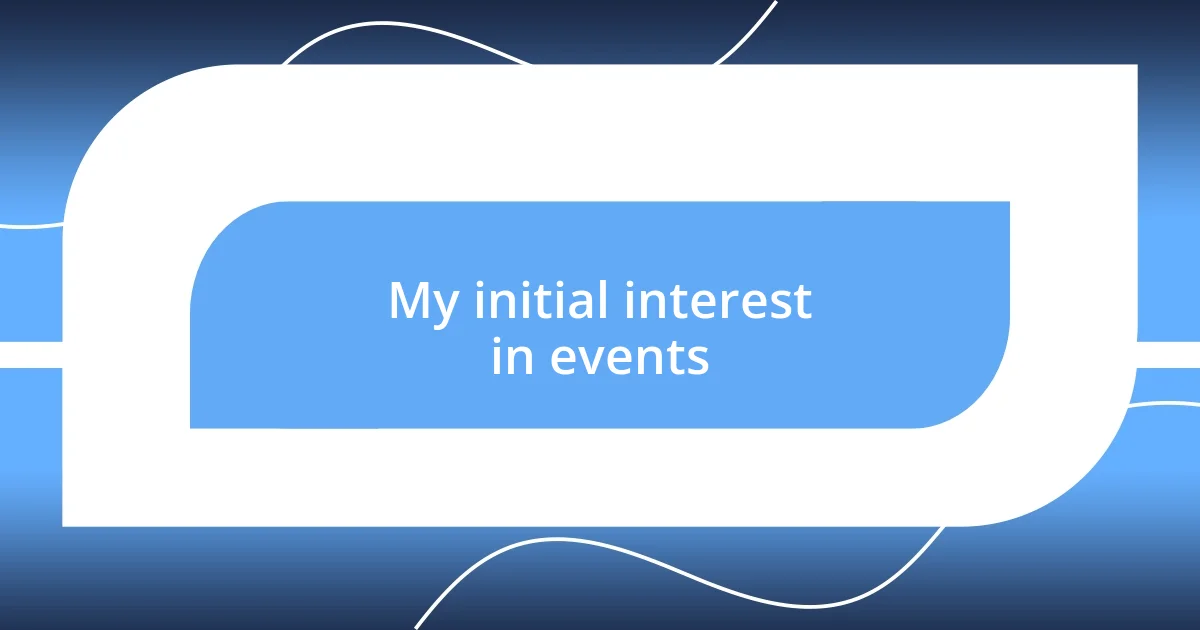
My initial interest in events
From a young age, I can vividly remember the thrill of organizing my own birthday parties. Each year, I meticulously planned every detail—from the theme and decorations to the guest list. Was there anything more rewarding than seeing friends smile at my creative choices? That first taste of bringing people together sparked something within me.
In high school, I took my passion a step further by volunteering for various school events. One of my favorite experiences was coordinating a fundraiser. I remember the excitement as we brainstormed ideas and watched our plans unfold. Seeing the community rally together made me realize the powerful impact events can have on people.
Reflecting on those moments, I sometimes wonder: what draws me to this field? It’s the connection—the way an event can create lasting memories and foster relationships. That innate desire to inspire joy in others has driven my journey in event planning, and I feel fortunate to have found this path.
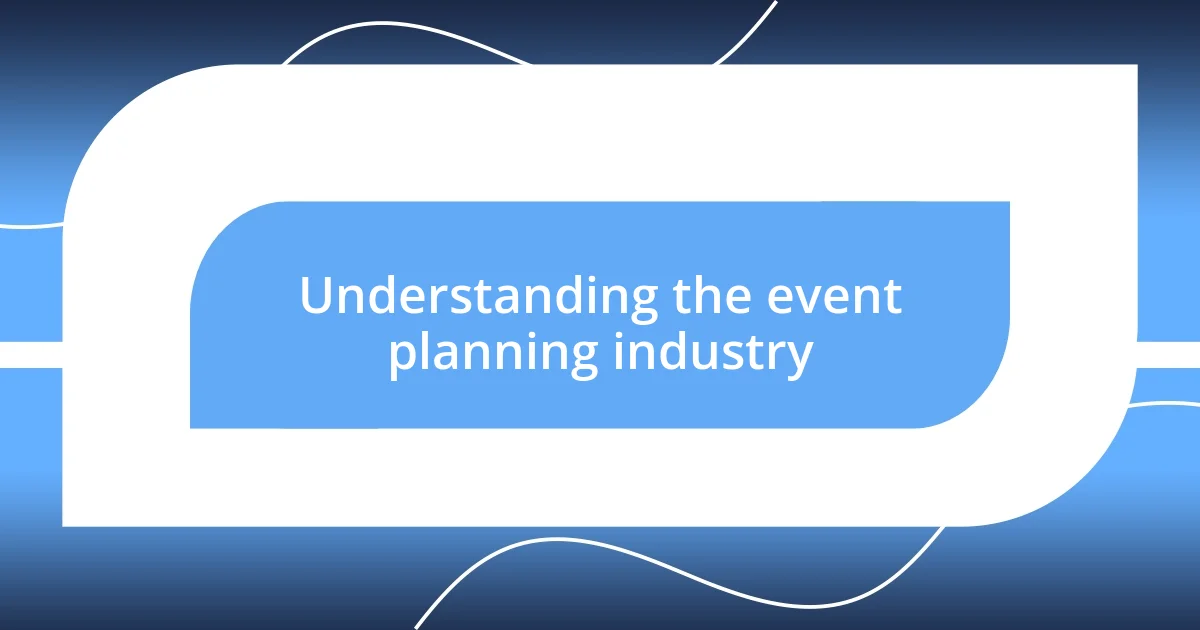
Understanding the event planning industry
Understanding the event planning industry is essential for anyone considering a career in this vibrant field. It’s a dynamic landscape where creativity meets logistics, and every event tells a unique story. I often find that, while the glamorous aspects of planning such as themes and decorations capture attention, it’s the behind-the-scenes work that truly matters. The challenge of coordinating various elements, from vendors to timelines, is where the real artistry lies.
- The event planning industry encompasses a range of activities, including corporate events, weddings, conferences, and more.
- Strong communication skills are vital; planners must liaise among clients, vendors, and venues.
- Budget management is a key component; staying within financial constraints while delivering a memorable experience can be tough.
- Networking plays a significant role; building relationships with suppliers and venues can open doors to new opportunities.
- The industry is ever-evolving, especially with technology impacting how events are planned and executed.
Reflecting on my journey, I remember attending my first large-scale conference. I was both nervous and excited, feeling the energy in the room as professionals connected and shared ideas. That experience underscored for me the potential of events to inspire creativity and foster growth. It reminded me that, while planning requires precision, the true heart of the industry lies in the ability to forge connections and craft unforgettable experiences.
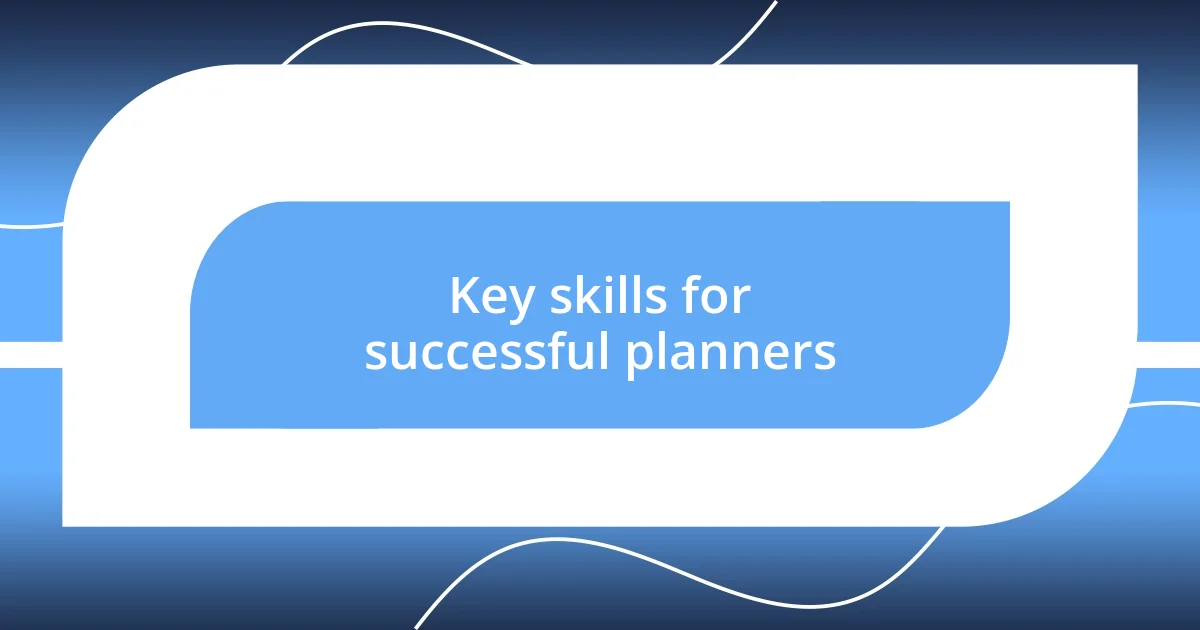
Key skills for successful planners
When I reflect on the key skills needed for successful event planners, adaptability immediately comes to mind. The ability to adjust plans on the fly is essential; I once had a wedding coordination session where unexpected weather forced us to move an outdoor ceremony indoors. Watching chaos turn into a beautifully intimate setting was a testament to how quickly and creatively I could pivot, and that experience taught me that flexibility often leads to unexpected beauty.
Another vital skill is attention to detail. I recall planning a corporate retreat where meticulous organization made all the difference. From color-coded schedules to ensuring every dietary preference was accounted for, it was those small touches that transformed a good event into a memorable one. The satisfaction I felt when attendees praised the seamless flow was incredible, reinforcing my belief that every detail counts.
Lastly, effective communication cannot be underestimated. I often find myself navigating conversations with clients and vendors, making it crucial to articulate visions clearly. I remember a particularly challenging negotiation with a venue. By listening actively and expressing my needs, I reached a compromise that not only met my client’s expectations but also strengthened my relationship with the venue. It’s these collaborative dialogues that turn ideas into reality.
| Skill | Description |
|---|---|
| Adaptability | The ability to adjust plans in response to unexpected changes. |
| Attention to Detail | Focusing on small elements that can enhance the overall event experience. |
| Effective Communication | The skill to convey ideas clearly and build strong relationships. |
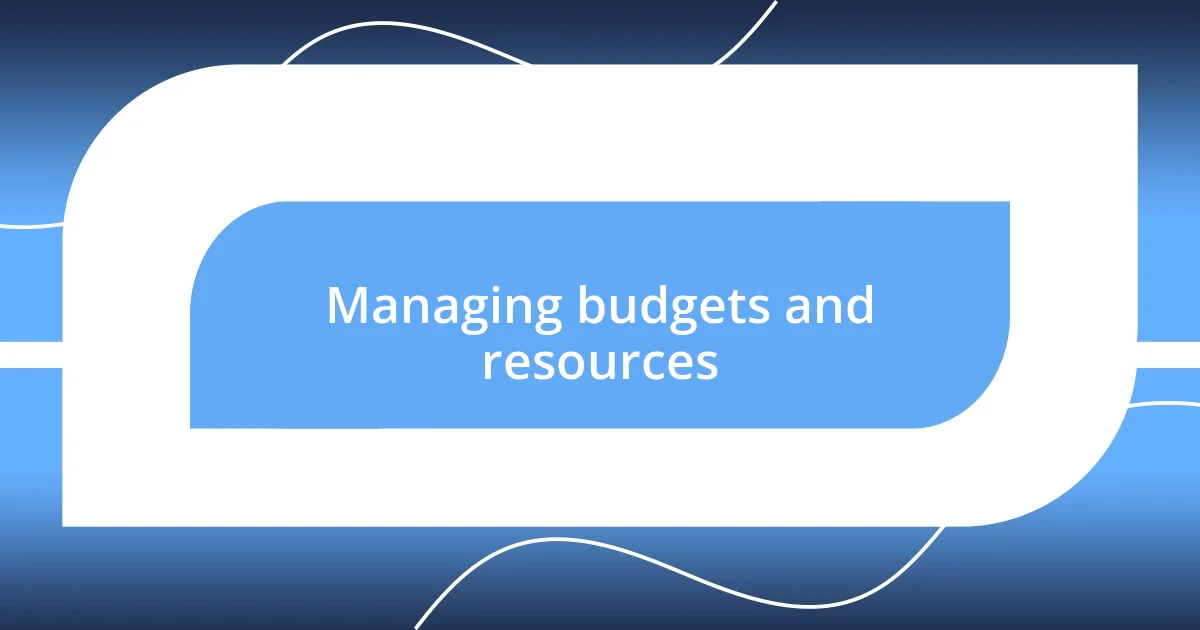
Managing budgets and resources
Managing budgets and resources is often the heartbeat of successful event planning. I’ll never forget the time I was tasked with organizing a charity gala on a tight budget. The challenge felt daunting, yet it pushed me to get creative. Dividing the budget into categories—venue, catering, entertainment—helped me prioritize and allocate funds effectively. By negotiating with local vendors, we secured quality services at reduced rates, which felt like a small victory.
I find that keeping track of every dollar spent is crucial. After all, one unexpected expense can derail the entire plan. During a corporate workshop I once organized, a last-minute venue change added pressure, but I quickly adapted by reallocating funds from less critical areas. It reminded me of how essential it is to have a contingency plan. Have you ever felt that rush of figuring out a solution just in time? Those moments can be overwhelming, but they also bring a sense of accomplishment.
One of the most valuable lessons I learned is the importance of resourcefulness. In my early days, I struggled to stay within budget, but now I see the value in leveraging my location and community resources. I remember sourcing decor from local artists instead of pricey rentals; not only did this cut costs, but it also added a unique flair to the event. Have you ever tapped into your local community for support? It transforms budgets from restrictions into opportunities, making the planning process much more enjoyable.
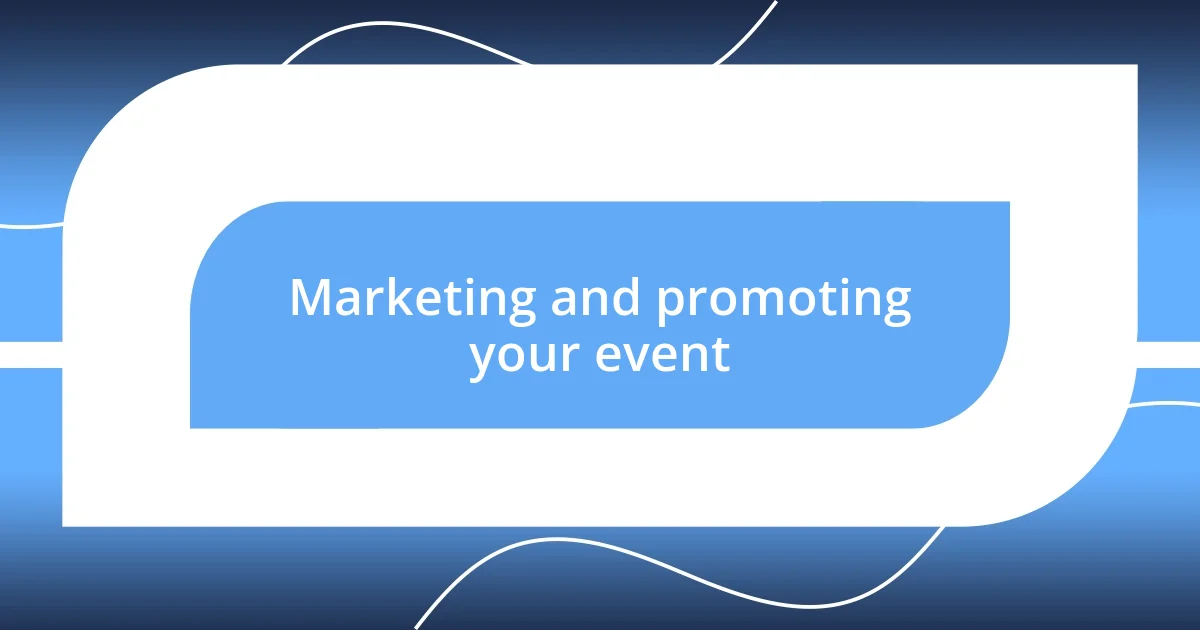
Marketing and promoting your event
When it comes to marketing and promoting your event, I believe social media plays a pivotal role. I remember launching a community art festival and utilizing platforms like Instagram and Facebook to create a buzz. The excitement of seeing local artists sharing posts about the event was infectious, showing how grassroots engagement can amplify your reach. Have you experienced the power of a share or a tag? It’s remarkable how a single post can bring together a community.
Email marketing is another strategy I swear by. After organizing a food festival, I gathered emails from previous attendees and created a series of engaging newsletters. Each email was a blend of countdowns, sneak peeks of featured vendors, and personal stories that connected the audience to the event’s vision. Seeing open rates soar felt like sending an invitation to friends—I genuinely connected with them, making them feel part of something special. Remember, the more personal you can make it, the more likely people will resonate with your message.
Don’t underestimate the influence of local partnerships. I’ve found that collaborating with local businesses not only helps pool resources but also boosts credibility. During a charity event, we teamed up with a local bookstore that hosted our ticket sales. Their loyal customers became aware of our cause, which forged new connections and enriched the event experience. Have you ever thought about how collaboration can elevate your event’s presence? It’s this synergy that transforms a simple gathering into a cherished community occasion.
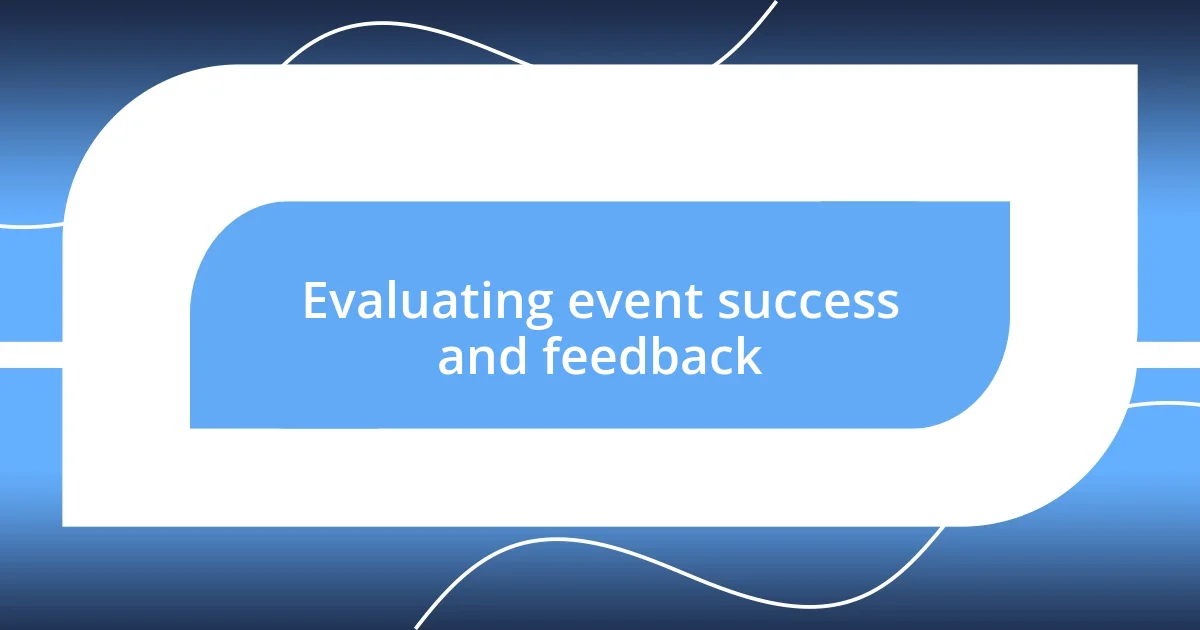
Evaluating event success and feedback
Evaluating an event’s success is a more nuanced process than simply counting attendees or total revenue. I’ve learned to analyze various feedback channels, from informal conversations to structured surveys. For instance, after organizing a tech symposium, I encouraged attendees to rate their experience, and the insights gathered were eye-opening. Did they feel the sessions were relevant? Did they enjoy the networking opportunities? These answers helped me gauge not just what worked but what could be improved next time.
It’s crucial for me to reflect on both the quantitative and qualitative data after each event. Following a music festival I coordinated, I received a heartwarming note from a participant who made lifelong friends that day. Did that touch me? Absolutely. It highlighted the non-tangible successes that numbers alone can’t capture. I’ve found that sometimes, it’s the smallest stories from participants that reveal the true impact of an event, often reminding me why I love what I do.
When I think about feedback, I realize that closing the loop is important. After a recent charity run, I reached out to participants with a thank-you note and a short survey, genuinely inviting their thoughts. This simple gesture opened a dialogue, making them feel heard and valued. Isn’t it nice when your effort gets acknowledged? Their responses provided me vital insights—one participant suggested an additional wellness area, which I’m now seriously considering for our next run. Listening to feedback isn’t just about gathering data; it’s about fostering a community that feels involved in the evolution of the event, and that’s incredibly rewarding.






